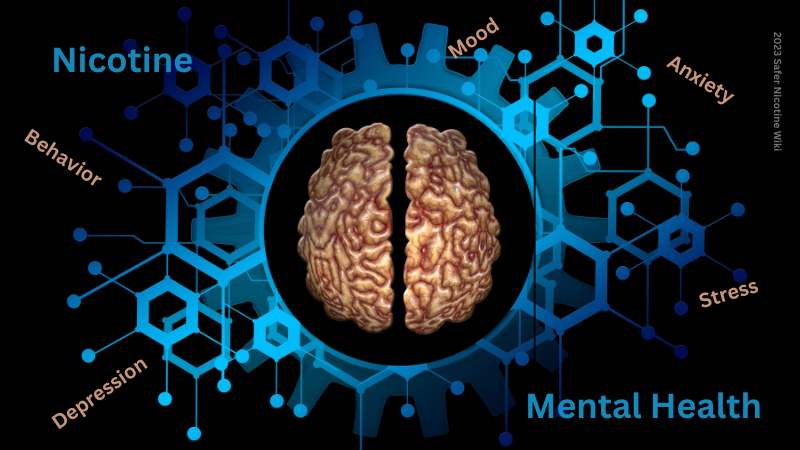Does nicotine cause mental health issues?

Or do people with mental health issues have a higher rate of using nicotine?
Scientific Publications - Youth and Young Adults
2009: Childhood depressive symptoms and adolescent cigarette use: A six-year longitudinal study controlling for peer relations correlates.
- Depressive symptoms in childhood may lead to altered developmental trajectories that either directly or indirectly contribute to adolescent outcomes, including cigarette use.
- Citation: Prinstein, M. J., & La Greca, A. M. (2009). Childhood depressive symptoms and adolescent cigarette use: A six-year longitudinal study controlling for peer relations correlates. Health Psychology, 28(3), 283–291. https://doi.org/10.1037/a0013949
2008: The relationship between and cigarette smoking in depressive symptoms U S adolescents
- The present results suggest that, in childhood and early adolescence, disruptive disorder should be the focus of prevention and intervention efforts. Youths with disruptive disorder are at increased risk not only for developing mood disorder but also for other negative psychosocial outcomes, including smoking and the development of nicotine dependence with the health burdens that it entails.
- By contrast, nicotine dependence did not predict the onset of a psychiatric disorder.
- Citation: Griesler, P. C., Hu, M.-C., Schaffran, C., & Kandel, D. B. (2008). Comorbidity of Psychiatric Disorders and Nicotine Dependence Among Adolescents: Findings From a Prospective, Longitudinal Study. Journal of the American Academy of Child & Adolescent Psychiatry, 47(11), 1340–1350. doi:10.1097/chi.0b013e318185d2ad
2000: Are social fears and DSM-IV social anxiety disorder associated with smoking and nicotine dependence in adolescents and young adults?
- Among baseline non-users with social fears and the superordinated group of nondependent respondents with social fears, we found significantly increased odds for subsequent occurrence of nicotine dependence during the four-year follow-up period.
- Citation: Sonntag, H., Wittchen, H. ., Höfler, M., Kessler, R. ., & Stein, M. . (2000). Are social fears and DSM-IV social anxiety disorder associated with smoking and nicotine dependence in adolescents and young adults? European Psychiatry, 15(1), 67–74. doi:10.1016/s09249338(00)00209-1
1998: The relationship between depressive symptoms and cigarette smoking in US adolescents
- Adolescents with depressive symptoms were more likely than other adolescents to start smoking.
- Initiation of smoking may occur rapidly among adolescents who feel depressed, anxious, or experience frequent stressful events.
- Citation: Escobedo, L. G., Reddy, M., & Giovino, G. A. (1998). T he relationship between and cigarette sm oking in depressive sym ptom s U S adolescents. Addiction, 93(3), 433–440. doi:10.1046/j.1360-0443.1998.93343311.x
1998: Depression, anxiety, and smoking initiation: a prospective study over 3 years.
- Depressive and anxiety symptoms are associated with higher risks for initiation through an increased susceptibility to peer smoking influences. Promoting the psychological well-being of adolescents and addressing perceived interpersonal benefits of smoking may play a role in the prevention of adolescent tobacco use.
- Citation: G C Patton, J B Carlin, C Coffey, R Wolfe, M Hibbert, and G Bowes, 1998: Depression, anxiety, and smoking initiation: a prospective study over 3 years. American Journal of Public Health 88, 1518_1522, https://doi.org/10.2105/AJPH.88.10.1518
Scientific Publications - Not Youth Specific
2014: Investigating the possible causal association of smoking with depression and anxiety using Mendelian randomisation meta-analysis: the CARTA consortium
- Findings from Mendelian randomisation analyses do not support a causal role of smoking heaviness in the development of depression and anxiety.
- Citation: Taylor, A. E., Fluharty, M. E., Bjørngaard, J. H., Gabrielsen, M. E., Skorpen, F., Marioni, R. E., Campbell, A., Engmann, J., Mirza, S. S., Loukola, A., Laatikainen, T., Partonen, T., Kaakinen, M., Ducci, F., Cavadino, A., Husemoen, L. L. N., Ahluwalia, T. S., Jacobsen, R. K., Skaaby, T., Ebstrup, J. F., … Munafò, M. R. (2014). Investigating the possible causal association of smoking with depression and anxiety using Mendelian randomisation meta-analysis: the CARTA consortium. BMJ open, 4(10), e006141. https://doi.org/10.1136/bmjopen-2014-006141
2013: The causal role of smoking in anxiety and depression: a Mendelian randomization analysis of the HUNT study
- As there was no association of the smoking-related rs1051730 SNP with anxiety and depression among smokers, the results suggest that smoking is not a cause of anxiety and depression.
- Citation: Bjørngaard, J. H., Gunnell, D., Elvestad, M. B., Davey Smith, G., Skorpen, F., Krokan, H., Vatten, L., & Romundstad, P. (2013). The causal role of smoking in anxiety and depression: a Mendelian randomization analysis of the HUNT study. Psychological medicine, 43(4), 711–719. https://doi.org/10.1017/S0033291712001274
2011: Smoking Is Associated with, but Does Not Cause, Depressed Mood in Pregnancy – A Mendelian Randomization Study
- Our results do not support a causal role of smoking on depressed mood, but are consistent with a self-medication hypothesis, whereby smoking is used to alleviate symptoms of depression.
- Citation: Lewis SJ, Araya R, Smith GD, Freathy R, Gunnell D, Palmer T, Munafò M. Smoking is associated with, but does not cause, depressed mood in pregnancy--a mendelian randomization study. PLoS One. 2011;6(7):e21689. doi: 10.1371/journal.pone.0021689. Epub 2011 Jul 19. PMID: 21818261; PMCID: PMC3139580.